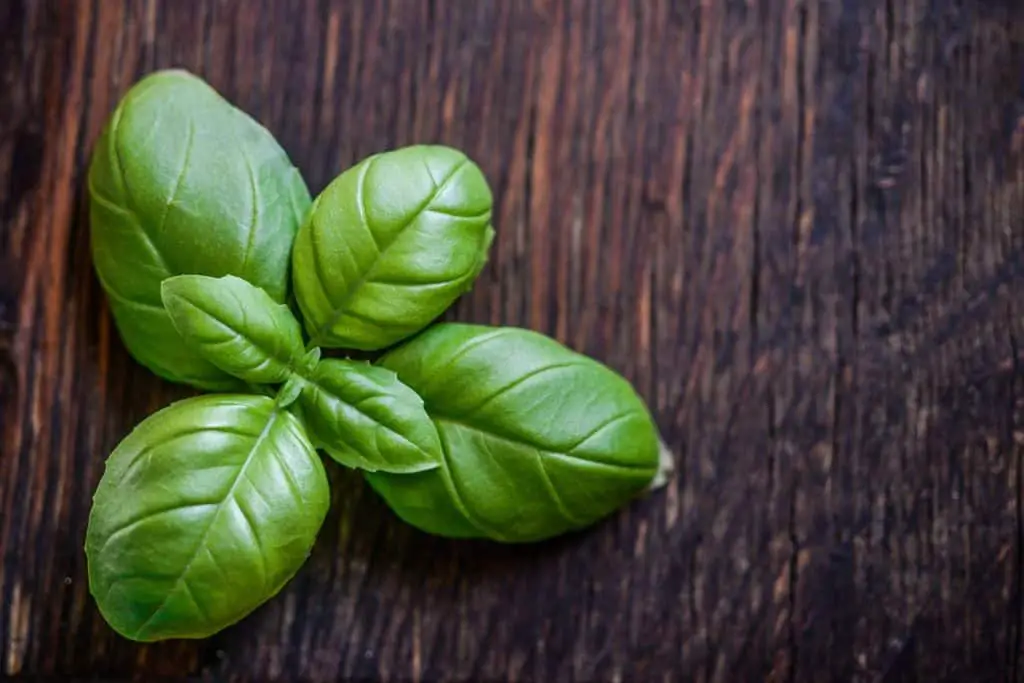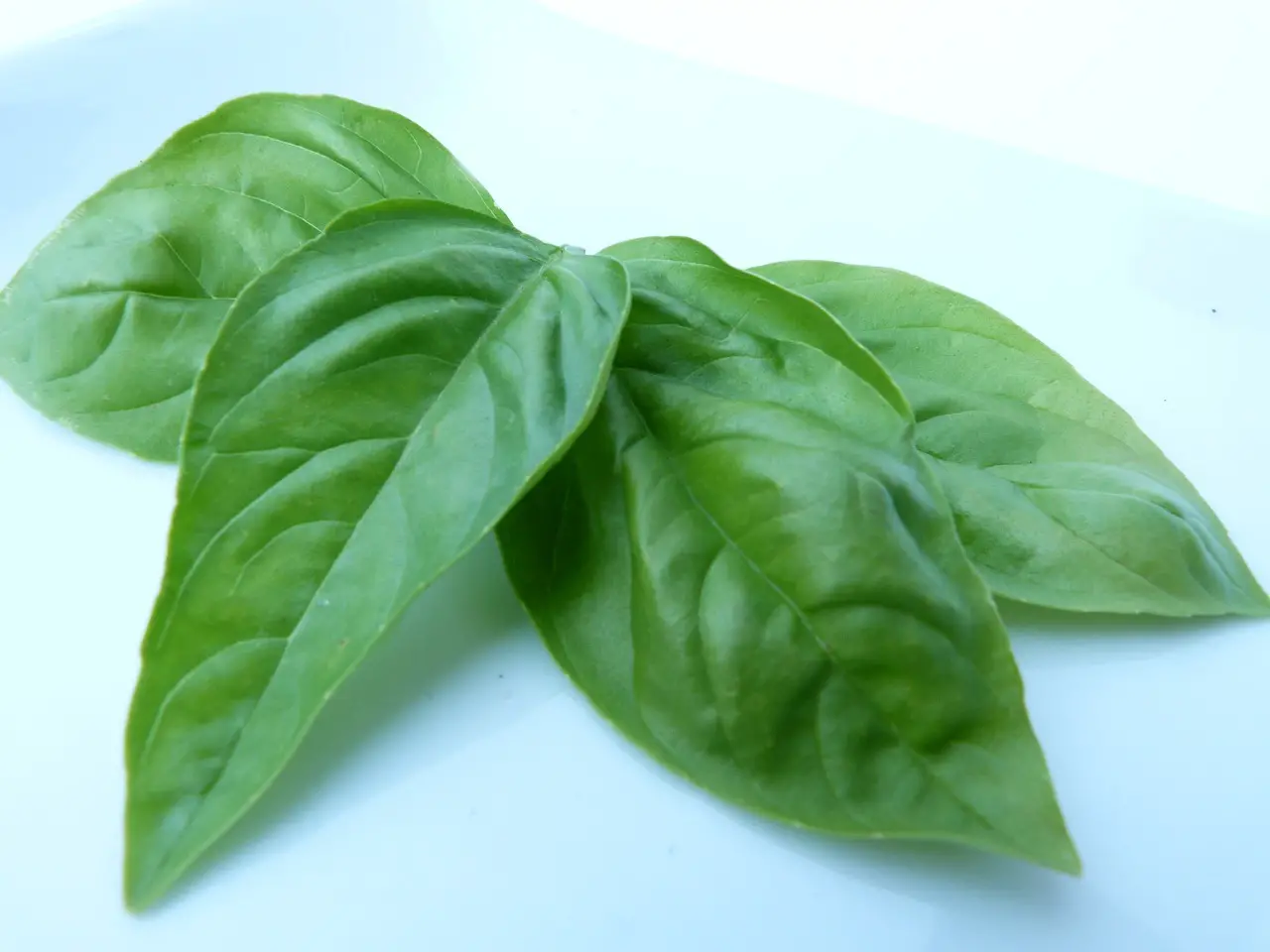
Basil leaves offer a plethora of health benefits, rich in antioxidants, anti-inflammatory, and antibacterial properties. They contribute to heart health, reduce oxidative stress, and support liver function. Basil also aids in blood sugar regulation and stress management through its adaptogenic qualities. Additionally, its essential oils can enhance skin health and provide relief from respiratory conditions. Incorporating basil into your diet not only adds flavor to dishes but also boosts overall wellness.
What Is Basil
Basil, with its origins tracing back to India, Asia, and Africa, was once revered as a sacred and distinguished herb, its name deriving from the Greek “basilikhon,” meaning “royal.” Nowadays, Ocimum basilicum, as it’s scientifically known, is cultivated globally, often found in home kitchens and gardens. Esteemed for its aromatic presence, basil is a staple in culinary traditions, particularly in Italian and Thai dishes, enhancing a myriad of recipes with its fragrance. Among its over 60 varieties, sweet basil stands out for its widespread use, characterized by its vibrant green, sometimes purple or red-tinted, pointed leaves. Each variety, from the citrusy lemon basil to the cool mint basil, offers a unique taste profile, enriching dishes with both flavor and a wealth of health benefits, making basil a versatile and beneficial herb in the culinary world.
The Benefits Of Basil Leaves
Antioxidant Power
Basil acts as a natural shield against oxidative stress, thanks to its rich arsenal of antioxidants like flavonoids. These compounds diligently neutralize harmful free radicals in the body, reducing the risk of chronic diseases such as heart conditions, diabetes, and arthritis. Additionally, basil’s antioxidants support a robust immune system, slow aging, and safeguard cellular integrity from environmental damage.
Cancer Prevention
Basil’s unique phytochemicals provide a protective barrier against various types of cancer, including those affecting the skin, lungs, mouth, and liver. By inhibiting the proliferation and spread of cancerous cells, basil contributes to a holistic cancer prevention strategy. This claim is backed by research from the American Institute For Cancer Research, highlighting basil’s role in oncological health.
Digestive Health
Eugenol, a key compound in basil, offers anti-inflammatory properties that ensure the digestive tract’s well-being. By facilitating smooth digestion and maintaining a balanced pH level, basil enhances both digestive and nervous system functions. It also acts as a natural laxative, offering relief from constipation and promoting regular bowel movements.
Skin Care
Basil’s potent essential oils penetrate deep into the skin, offering a cleansing effect that’s particularly beneficial for oily skin types. It regulates oil production, removes impurities, and combats stubborn acne through its antimicrobial properties. A homemade basil face pack can rejuvenate the skin, giving it a fresh, youthful appearance.
Diabetes Management
Incorporating basil into the diet can significantly aid in managing diabetes by moderating blood sugar release. Research on both animals and humans demonstrates basil’s efficacy in addressing diabetes-related challenges, such as hyperinsulinemia and weight management, showcasing its therapeutic potential in metabolic health.
Anti-inflammatory Effects
Basil’s robust anti-inflammatory properties, attributed to essential oils like citronellol and eugenol, provide relief from a spectrum of inflammatory conditions, including heart diseases and arthritis. Its therapeutic effects extend to common ailments, offering natural remedies for headaches, colds, and flu symptoms.
Mental Well-being
The adaptogenic qualities of basil make it a natural remedy for stress, anxiety, and depression. By stimulating neurotransmitters responsible for energy and happiness, basil tea can significantly uplift mood and improve mental health, offering a serene respite from the stresses of daily life.
Detoxification
Basil supports liver health by enhancing the body’s detoxification processes. It boosts antioxidant levels and enzyme activities that help eliminate free radicals, thereby aiding in liver detoxification and preventing fat accumulation. This purification process extends to the blood, ensuring a cleaner, healthier system, and contributing to overall vitality and longevity.
Holy Basil Benefits
Early research indicates that holy basil may alleviate asthma symptoms by reducing airway inflammation. Although some of this evidence comes from animal studies, clinical trials involving humans have shown improvements in airway swelling among participants using holy basil. However, these studies lacked control groups not using the herb, highlighting the need for further research to conclusively determine its effectiveness in enhancing respiratory health and mitigating airway irritation commonly associated with asthma.
Basil Nutrition
In a serving of 2 tablespoons (5 grams) of freshly chopped basil, the nutritional content includes:
- Calories: 1
- Protein: 0.2 grams
- Fat: 0 grams
- Carbohydrates: 0.1 grams
- Fiber: 0.1 grams
- Sugar: 0 grams
Additionally, basil is a source of essential nutrients, such as:
- Calcium
- Vitamin A
- Vitamin K
- Manganese
- Magnesium
- Iron
- Zinc
- Potassium
These components make basil not only a flavorful addition to dishes but also a beneficial one for health.
How To Prepare Basil
Fresh basil, available in the grocery’s produce aisle, offers a burst of flavor to a wide array of dishes. Opt for leaves that are vibrant and richly green, indicating freshness. To extend its shelf life, store basil in the fridge, wrapped in a damp cloth or paper towel to maintain moisture.
Incorporating Basil into Your Meals
Basil’s versatility in the kitchen is unmatched. Here are some creative ways to weave it into your meals:
- Create a classic Caprese salad with layers of basil, mozzarella, and tomatoes, seasoned with black pepper and olive oil.
- Enhance pizzas or pastas by sprinkling basil, either whole or chopped, just before serving.
- Stir it into soups or sauces for a fresh flavor boost.
- Elevate your pesto or hummus by blending in fresh basil.
- Incorporate basil into lasagna for an aromatic twist.
- Freshen up salads, like grilled corn or watermelon salad, with a handful of basil.
- Experiment by garnishing vanilla ice cream with basil for a unique dessert.
Maximizing Basil’s Flavor in Cooking
To fully capture basil’s aromatic essence, add it to dishes towards the cooking’s end. Basil’s essential oils are delicate; incorporating them late preserves their robust flavor, enriching your culinary creations with the herb’s signature zest.
Benefits Of Eating Basil Daily
Incorporating basil into your daily diet offers numerous health benefits. Rich in antioxidants, basil helps combat oxidative stress and supports cellular health. It possesses anti-inflammatory properties, aiding in reducing inflammation and enhancing overall well-being. Basil’s antimicrobial qualities can protect against infections, while its adaptogenic nature helps manage stress and anxiety. Regular consumption can also contribute to heart health by regulating blood pressure and cholesterol levels. Moreover, its nutrient-dense profile, including vitamins and minerals, bolsters the immune system and promotes healthy skin.
FAQ
What Are The Benefits Of Drinking Boiled Basil Leaves
Drinking boiled basil leaves offers health benefits such as detoxification and immune system support. The process releases antioxidants that combat free radicals, reducing oxidative stress. It also soothes the digestive system, alleviates stress, and has antimicrobial properties that can ward off infections. Additionally, it can help regulate blood sugar levels, making it a beneficial herbal remedy for overall wellness.
